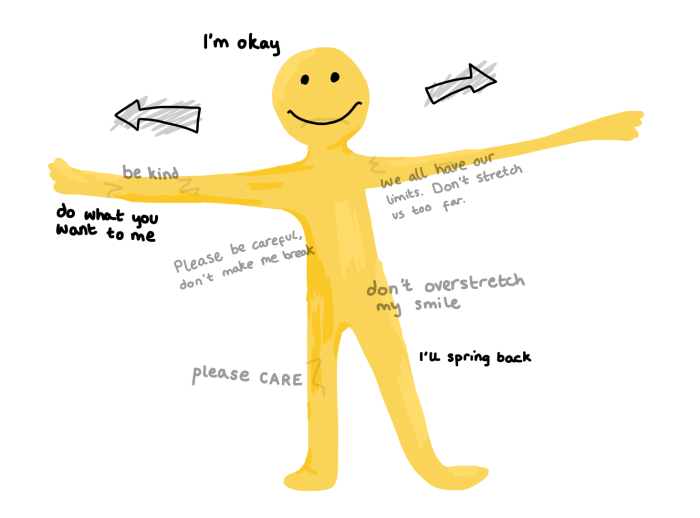So today I thought I’d share with you my experiences with inpatient treatment for anorexia.
Inpatient treatment is often a last resort for treating eating disorders, because you can easily pick up other bad habits from the other patients, and according to statistics if you go inpatient once, you are likely to relapse and go back again. Personally, I don’t believe the backing behind this research is strong enough, and from my point of view inpatient care is often the only solution for many.
Everyone has their own circumstances, and I personally was having huge struggles not only within myself and my disorder(s), but my dad was also diagnosed with cancer a few months into my recovery and was unable to help me any more. Obviously seeing one of my loved ones so sick had a huge impact on me, and although going away was hard it was what I needed. I also felt less guilty because I felt my mum and sister should be looking after and helping him not me, after all, it’s all in my head right? After over a year of recovery I am starting to accept that perhaps it wasn’t my fault, and although maybe my reasons behind feeling less guilty being inpatient weren’t the best, the inpatient experience was still of extreme use to me.
Originally I was admitted as a day patient (back in October 2013), but after exactly a month of being there I was transferred inpatient when my depression and suicidal thoughts were getting out of hand.
I was inpatient for several months, before returning to day patient and eventually being discharged in August 2014.
Day patient and inpatient are pretty similar; I went to the Priory in Roehampton and the day patients and inpatients share the same timetable/ living area, so apart from the evenings and sleeping arrangements it’s practically the same. Day patient can be a great alternative for many reasons, especially if you live close by and your parents want you at home. (Unfortunately I lived a 45minute drive away from the Priory, and driving there and back 6 days a week was pretty exhausting and left me with little time to shower and sleep).
The days had the following structure:
Breakfast at 8.00am (although they were always late!)
Education from 9-10.30, then we had a half hour break where people who who were on snacks had their snacks (depending on your meal plan), then people on walks went on a walk (depending on your weight and if you’re gaining/ maintaining as required).
Then back to education from 11-12.30.
Sometimes we’d have groups for 30mins before lunch, or we’d sit and chat in the lounge.
Lunch at 1-2pm.
2-3pm another therapy group
3-3.45 snack (again, for those on snacks)
3.45-4.45 another therapy
5-5.15 walk (again, for those on walks)
Sometimes we’d have groups from 5-5.30, but usually not as we all weren’t well and didn’t have great concentration, and the days just seemed so long.
Dinner was at 6pm, then we could shower from 8 onwards.
Night snack at 10pm, then we had ‘reflection’ where we shared our highs and lows of the day and set a goal for the next day, before being allowed to go to bed at 10.30pm (and it felt so late when you’re exhausted!)
We had the three meals a day which we were allowed 30 minutes to eat, and 15 minutes for puddings.
We then had an hour of supervision, where we were only allowed to go to the loo if we counted out loud (so they could check we weren’t doing anything) with staff outside the door.. (This, in case you were wondering, is actually a real challenge to do and also very awkward)
There were 2 tables; supervised and semi-supervised.
The supervised table was the one you started on where the staff could watch you and try to stop any food behaviours, such as cutting your food up too small or not mixing anything on your plate.
Everyone worked towards the semi-supervised table, where your plates would be checked after the meal, but you weren’t supervised during it.
When you’re stuck in a unit all day (and night) it felt like freedom, and the mixture of emotions I felt on my first day on that table are ones I’ll never forget. I was excited, nervous, proud, ashamed all at the same time; many of the conflicting emotions being my eating disorder. But this transition helped me feel more in control of my recovery, like I was the one making the choice to recover, which was both terrifying and exciting. I think that is an important step for anyone’s recovery.
Another meal time privilege you got after making significant progress and proving yourself to the staff was self-serving. This meant that, under supervision and guidance, you got to portion/ serve your own meals. You still got the same amount, but again, it was this feeling of responsibility and showing (not only to the staff, but to yourself too) that you could do it that mattered.
Everyone took part in the following therapies:
• Food behaviours
• Therapy group
• Drama therapy
• Drumming
• RO-DBT
• Games therapy
• Food and me
• Body image
• CBT
• Everyone had a key worker and co-worker who you would talk to each week. You also had ward round once a week where you’d get to talk to your Doctor and key worker about your care plan and discuss leave.
We were also offered extra activities depending on your weight/ stage of recovery, such as:
• Snack cookery
• Outings
• Swimming
• Exercise
• Yoga
• Dance and movement
A few things I liked about it:
I made some incredible lifelong friends, and for once in my life felt like people understood me and I could relate with others in how I felt.
We were given so many different therapies and I felt like I actually had a chance at recovery.
They don’t pressure you to leave and want you to feel ready before you’re discharged.
There were people there struggling from various eating disorders and at various stages of recovery, and the sense of community and helping each other along was great. Seeing people nearing the end of their treatment was also inspiring and a goal to work towards.
A few things I disliked about it:
The other patients could also be triggering, and I found it hard being around so many other underweight people and feeling like the biggest there, but in a way I guess it helped me learn to cope with being around thin people in a controlled and safe environment.
Being away from home, especially when Dad was ill, was hard and I felt bad for inconveniencing my family.
I hope that this post gave an idea of what inpatient treatment is like and was helpful, though obviously treatment varies from place to place.
Inpatient treatment saved my life, I know I could never have recovered without it (I was with CAHMS for 6 months before I was admitted to the Priory, and I only ever got worse with them and made no progress at all), so even though I was there for 10 months, I wouldn’t change it if I could. I have learnt so many useful skills, and I couldn’t be more greatful. True, some may not have worked for me, but we’re all different and that’s ok.
I hope that through this blog I’ll be able to share what I’ve learnt and inspire others in their recovery, and I also
If I help just one person then this blog is worthwhile and I couldn’t be happier.
Thanks for reading.
The Priory Hospital, Roehampton




